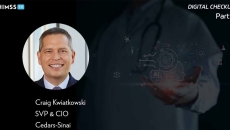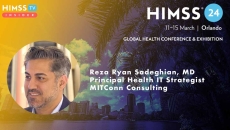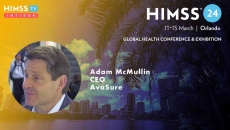Artificial Intelligence
Where possible, Cedars-Sinai likes to look for solutions within existing platforms, such as using Epic's In-basket message-response technology, which queues up a draft to edit and send, says CIO Craig Kwiatkowski.
The government needs to work with the private sector, which is light years ahead on AI, says public affairs director.
HIMSS24
These platforms have revolutionized the way physicians look at medical education in clinical practice, says Dr. Reza Ryan Sadeghian, principal health IT strategist at MITConn Consulting.
HIMSS24
The frameworks came out about the same time HIMSS released its annual healthcare cybersecurity survey, which this year shows how healthcare organizations are using AI, says Lee Kim, senior principal of cybersecurity and privacy at HIMSS.
HIMSS24
Kathleen McGrow acts as the workflow bridge from bedside to information technology, says chief nursing information officer at Microsoft, who also co-chairs a HIMSS innovation nursing advisory group.
HIMSS24
An AI strategy, telehealth and EHR touchless charting that allows physicians to focus on care, helps in treating patients in rural areas, says Khue Tran, chief strategy officer at Azalea Health.
HIMSS24
The health system plans to add AI and smart robotics as enabling technologies to further integrate intelligent connection between physician and patient, says medical director for clinical transformation and informatics Dr. Jonah Feldman.
The U.K.'s National Health Service is testing the platform to find hard-to-diagnose conditions and patients with cachexia, says Dr. Vibhor Gupta, director and founder of Pangaea Data.
HIMSS24
Enabled by AI, AvaSure has a virtual nursing platform that is helping to bring the joy back to nursing, says CEO Adam McMullin.
An AI-powered alert system at Stanford Hospital is predicting which patients are in decline and keeping them from the ICU.









